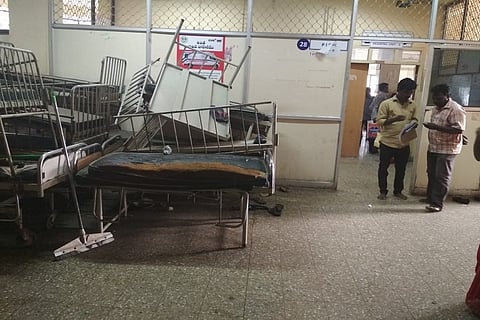

On many walls of the hospital, a poster reads ‘Keep your surroundings clean’. A cursory glance is enough to show why stressing on cleanliness is necessary. Paan stains, soiled diapers and leftover food are strewn all over the premises and the 90-odd sanitation workers at the hospital struggle to keep the premises clean as due hundreds of visitors the hospital sees on a daily basis.
On the third floor of the hospital in the pediatric emergency ward, someone has just passed urine in the ward corridor.
Kalama, a 53-year-old sanitation worker working in the ward curses the unknown culprit and begins mopping the floor. She peeps inside the toilet, wondering out loud why someone would pass urine outside the toilet and not inside. She is aghast at the sight of the mess in the toilet. "I just cleaned that toilet less than half an hour ago. Look at the state of it now," she says.
It’s just after lunch, and the toilet is littered with leftover food that relatives of patients admitted had. "People have their lunch and just throw the leftovers into the toilet. They don't even take the effort to put it in the dustbin. I cleaned that toilet twice today already," Kalama says.
The sanitation workers at the hospital begin their work at 8 am and do three rounds of cleaning by 3 pm. Their workload has increased since the hospital opened two new blocks — an outpatient ward and another emergency wing — in 2017, taking the number of beds from 500 to 950.
According to the National Guidelines For Clean Hospitals 2015, there must be one sanitation worker for every two hospital beds according to the Ministry of Health and Family Welfare, which then further has classifications. At Niloufer, there are only 90 sanitation workers for 950 beds.
Unable to maintain the general cleanliness, the hospital recently instructed the security guards to bar visitors from wearing footwear inside the hospital.
Shahida Y from Falaknuma is in the hospital to attend to her grandson, who has been admitted to the hospital. "How can anyone use the hospital toilet without wearing chappals? It's disgusting and unhygienic," the 54-year-old says. "My grandchild is weak and has a combination of fever and typhoid. I have to take that sick child, cross the road and go to the public toilet if the child has to visit the loo even when it rains. I am a diabetic patient myself, and have to drink two litres of water a day, but am drinking less water so as to avoid using the hospital loo," she says.
The family members of children who have been admitted to the hospital avoid using the hospital toilets and prefer to use the public toilets outside the hospital premises paying anywhere between Rs 5 to Rs 10 each time.
“One can't blame the sanitation workers as they are overburdened. Even for the doctors, there are not enough amenities at this hospital," the postgraduate student adds.
The sanitation staff earn Rs 12,500 a month and are hired through a firm which provides workers.
"We started operations at the hospital just eight months ago. The sanitation workers are hired based on the bedding ratio and the decision to hire more sanitation workers has to be taken by state government," says Shyam Sundar Reddy, the Director of the Agile Group that won a three-year contract to supply labour to all state-owned hospitals in the city.
The hospital administration has sent letters to the state government to increase the hospital’s bed strength at the hospital, but there is little clarity if the burden will fall on the already-overburdened sanitation workers, or if the hospital even plans to hire more.